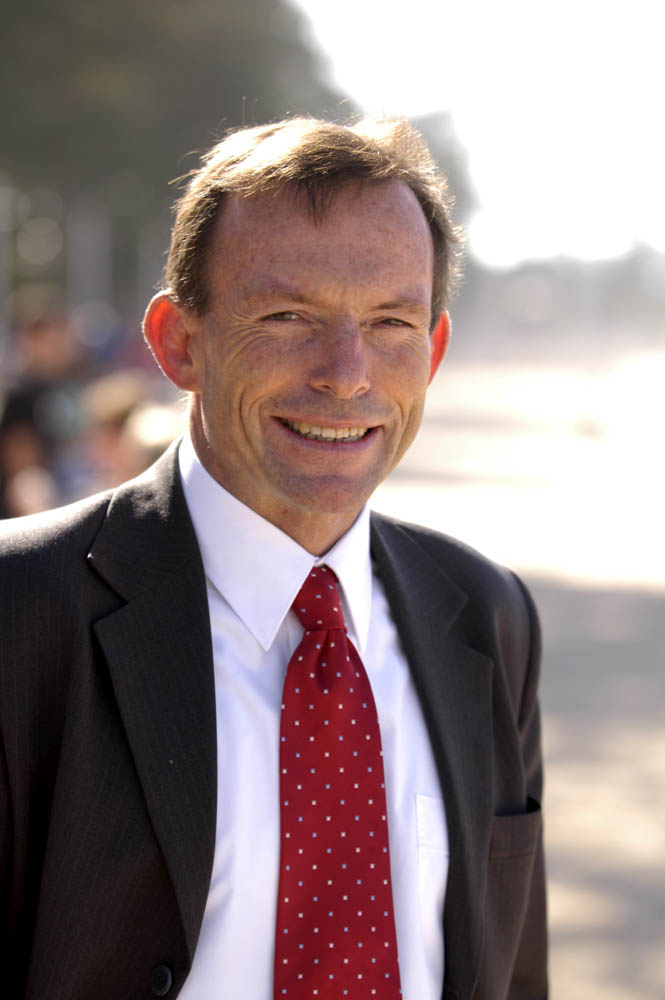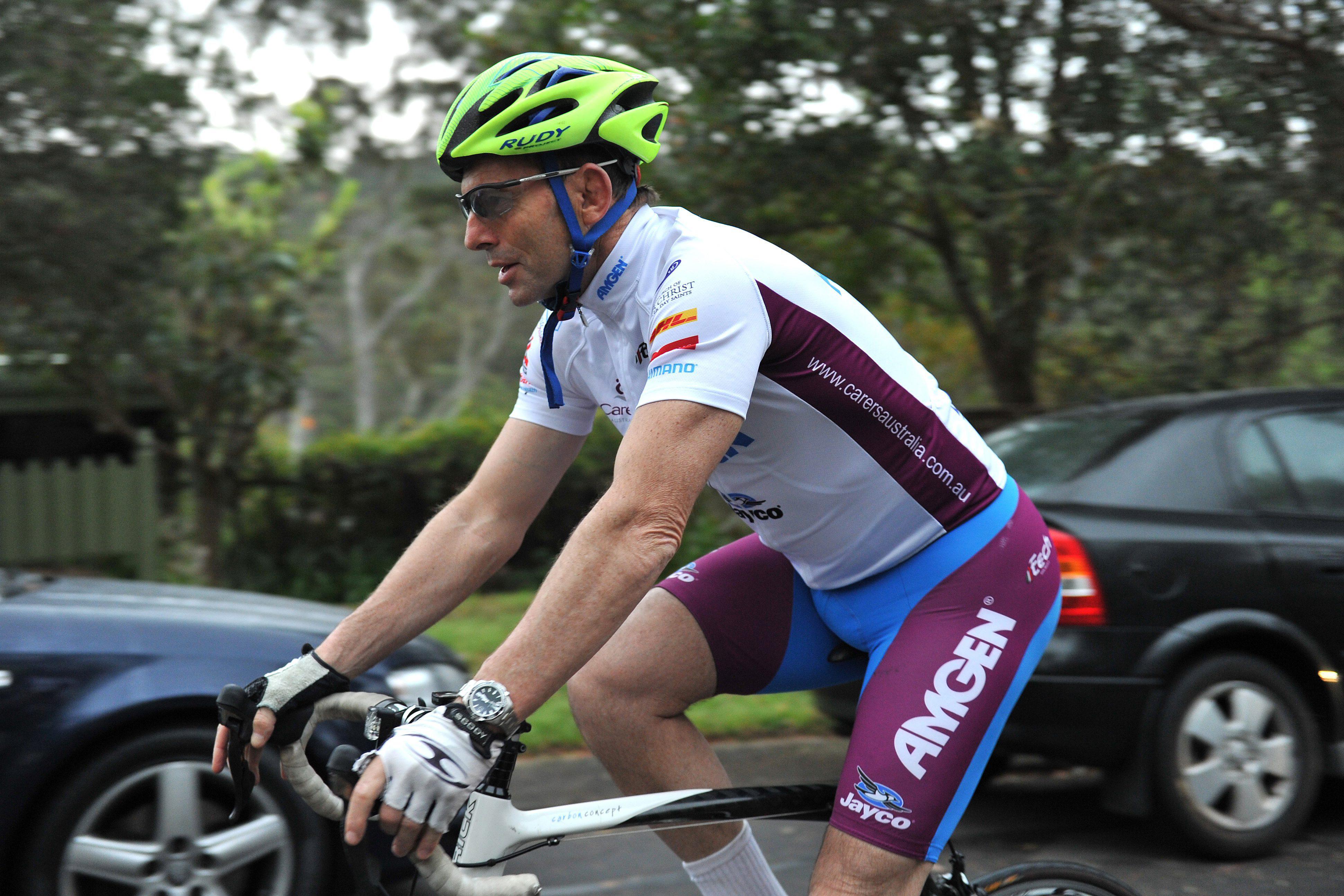Abbott, Tony (1957-…), is a politician who was prime minister of Australia from 2013 to 2015. He led a coalition (partnership) of the Liberal and National parties. He was elected leader of the Liberal Party in 2009. The Liberal Party is generally conservative on social issues. It favors free enterprise, a system that allows people to carry out most economic activities free from government control. Malcolm Turnbull successfully challenged Abbott for the leadership of the Liberal Party in 2015 and became prime minister.
Early life and family.
Anthony John Abbott was born in London on Nov. 4, 1957. His parents were Australian, and the family moved to Australia when Tony was a boy. After graduating from the University of Sydney , Abbott received a Rhodes Scholarship and studied at the University of Oxford in England. He graduated from Oxford with a master’s degree in politics and philosophy. In 1984, Abbott returned to Australia and studied to become a Roman Catholic priest. However, he left the seminary in 1987 before completing his training and began a career as a journalist. He married Margaret Aitken on Sept. 24, 1988. The couple have three daughters: Louise, Frances, and Bridget. 
Political career.
From 1990 to 1993, Abbott served as press secretary and political adviser to John Hewson, who was leader of the Liberal Party. In 1993 and 1994, Abbott was the director of an organization called Australians for Constitutional Monarchy. In that position, he worked to preserve Australia’s system of constitutional monarchy. Many Australians call for their nation to become a republic, with a president replacing the British monarch as head of state.
Abbott was first elected to Australia’s Parliament in 1994. He won a seat representing the constituency (voting district) of Warringah in the House of Representatives. He held several ministerial positions under John Howard in the late 1990’s and early 2000’s. In the outer ministry, he served as minister for employment services. In the Cabinet (also known as the inner ministry), he served as minister for employment and workplace relations and minister for health and aging. 
Abbott replaced Malcolm Turnbull as leader of the Liberal Party on Dec. 1, 2009. Under Abbott’s leadership, the coalition parties came close to winning the 2010 general election. This forced the Labor government to rely on the support of independents and members of Parliament from smaller parties in the House of Representatives. The coalition of the Liberal and National parties came to power following an election victory in September 2013.
Prime ministership.
One of the first issues Abbott addressed as prime minister was that of people seeking political asylum (shelter and protection). In the early 2000’s, an increasing number of people from countries such as Afghanistan, Iran, and Sri Lanka attempted to sail to Australia from Indonesia. Many of these refugees paid smugglers to take them on overcrowded wooden boats that were not sturdy enough to handle the rough waters between the two countries. Under Prime Minister John Howard, the Australian government sent many of these asylum-seekers to detention centers in the Pacific Island nations of Nauru and Papua New Guinea . Others were sent to processing centers on Christmas Island , an Australian territory in the Indian Ocean. The refugees were kept at these centers until their asylum claims could be processed.
During Kevin Rudd’s first term as prime minister, he ordered the Nauru and Papua New Guinea centers closed. The number of refugees continued to climb, and Prime Minister Julia Gillard ordered the Pacific Islands centers reopened in 2012. After Rudd returned to power in 2013, he announced that asylum-seekers arriving in Australia by boat would be resettled in Papua New Guinea rather than in Australia.
During the 2013 election campaign, Abbott made stopping the boats a key policy. After he became prime minister, the Royal Australian Navy began intercepting boats carrying asylum-seekers, sending them to Nauru and Papua New Guinea, or back to Indonesia. In September 2014, the governments of Australia and Cambodia signed a deal allowing some of the asylum-seekers to be resettled in Cambodia.
Another major focus of Abbott’s election campaign was to repeal a tax on carbon dioxide emissions introduced in 2012 under Prime Minister Gillard. The tax imposed a fee for each metric ton of greenhouse gases produced by the country’s highest polluting companies. Supporters of the tax, mostly from the Labor and Greens parties, argued that it helped combat climate change. (Most scientists believe that increased concentrations of carbon dioxide in the atmosphere, mostly from the burning of fossil fuels, are directly connected to climate change.) Members of the Liberal-National coalition argued that the tax would be bad for the economy and make energy services more expensive for consumers. Abbott instead supported a direct-action plan, under which a government fund would be used to pay polluters to reduce their emissions. After much debate, the Australian Parliament repealed the carbon tax in July 2014.
Abbott also worked to expand Australia’s economy. In 2014, his government signed free trade agreements with China, Japan, and South Korea to increase Australia’s exports of agricultural and other goods. That same year, Abbott’s government began assisting the United States and other nations in launching air strikes against Islamic State (also known as ISIS) militants in Iraq. In 2015, the government announced that it would also assist in launching air strikes against Islamic State targets in Syria. The rise of Islamic State and a civil war in Syria led thousands of people to flee that country. In September 2015, Abbott’s government announced plans to take in 12,000 refugees fleeing violence and war in Syria.
Later in September, Malcolm Turnbull successfully challenged Abbott for the leadership of the Liberal Party and became prime minister. Turnbull claimed Abbott had not successfully guided Australia’s economic policies. Abbott remained active in government and was reelected to Parliament in 2016. He lost his Parliamentary seat in a 2019 federal election. In 2020, Abbott was made a Companion of the Order of Australia, for his eminent service to the people and Parliament of Australia, particularly as prime minister. The Order of Australia is Australia’s highest award for service to the country or to humanity.
